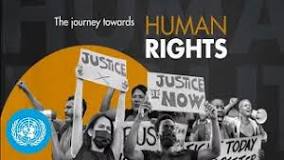In an increasingly interconnected world, the conversation about human rights is more relevant than ever. Human rights, fundamental to the dignity and well-being of every person, transcend geographical, cultural, and political boundaries. From freedom of speech to the right to education, these inalienable rights form the foundation of a just society. However, despite their universal recognition, human rights violations remain pervasive. This blog explores the essence of human rights, their significance, ongoing challenges, and the path forward to ensuring they are upheld for all.
Understanding...
In an increasingly interconnected world, the conversation about human rights is more relevant than ever. Human rights, fundamental to the dignity and well-being of every person, transcend geographical, cultural, and political boundaries. From freedom of speech to the right to education, these inalienable rights form the foundation of a just society. However, despite their universal recognition, human rights violations remain pervasive. This blog explores the essence of human rights, their significance, ongoing challenges, and the path forward to ensuring they are upheld for all.
Understanding Human Rights
Human rights are the basic rights and freedoms that belong to every person in the world, from birth until death. They apply regardless of where you are from, what you believe, or how you choose to live your life. These rights are inherent to all human beings, without discrimination. They are commonly divided into two categories:
- Civil and Political Rights: These include the right to life, freedom of speech, privacy, and the right to participate in government.
- Economic, Social, and Cultural Rights: These encompass the right to work, education, health, and an adequate standard of living.
The Historical Evolution of Human Rights
The modern conception of human rights can be traced back to the aftermath of World War II and the Holocaust, which highlighted the need for a global framework to protect individuals from atrocities. This led to the creation of the United Nations and the adoption of the Universal Declaration of Human Rights (UDHR) in 1948. Drafted by representatives from different cultural and legal backgrounds across the world, the UDHR set out, for the first time, fundamental human rights to be universally protected.
The Significance of Human Rights
Human rights are crucial for the protection of individuals and the foundation of peace and democracy:
- Protection of Individuals: They protect individuals from abuse and discrimination. For instance, the right to a fair trial ensures that justice is served impartially.
- Promotion of Equality: They strive to eliminate discrimination and promote equality. This includes combating gender discrimination, racial inequality, and other forms of systemic injustice.
- Foundation for Peace and Stability: Societies that respect human rights are more likely to be peaceful and stable. Respect for human rights reduces tensions and fosters mutual respect among different groups within a society.
- Empowerment of People: They empower people to shape their own lives and participate fully in society. Education and freedom of speech are fundamental in enabling individuals to contribute to the political and cultural life of their communities.
Current Challenges to Human Rights
Despite the global consensus on the importance of human rights, violations remain rampant:
- Political Repression: In many countries, authoritarian regimes suppress dissent, censor media, and imprison political opponents.
- Discrimination: Racial, gender, and religious discrimination continue to plague societies worldwide, denying individuals their basic rights.
- Economic Inequality: Extreme poverty and economic inequality prevent many from accessing basic needs such as education and healthcare.
- Refugee Crises: Conflicts and persecution have forced millions to flee their homes, often ending up in countries where their rights are not fully protected.
The Path Forward
Ensuring that human rights are respected and protected requires concerted efforts at all levels of society:
- Strengthening International Mechanisms: International bodies like the United Nations must be empowered to hold violators accountable and support nations in implementing human rights standards.
- National Legislation and Policy: Governments need to enact and enforce laws that protect human rights and address violations swiftly and effectively.
- Education and Awareness: Raising awareness about human rights through education can empower individuals to stand up for their rights and those of others.
- Civil Society Engagement: NGOs and grassroots organizations play a critical role in advocating for human rights and providing support to victims of violations.
- Individual Responsibility: Each of us has a role to play in promoting human rights, from challenging discrimination and injustice to supporting human rights organizations.
Conclusion
Human rights are the cornerstone of a fair and just society. While significant progress has been made since the adoption of the UDHR, the struggle for universal human rights continues. It is imperative that we remain vigilant and committed to protecting these rights for everyone, everywhere. By working together—governments, international bodies, civil society, and individuals—we can ensure that the promise of human rights becomes a reality for all.





 Sign in with Google
Sign in with Google
 Sign in with Facebook
Sign in with Facebook
